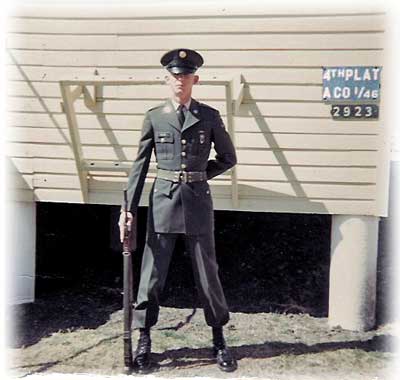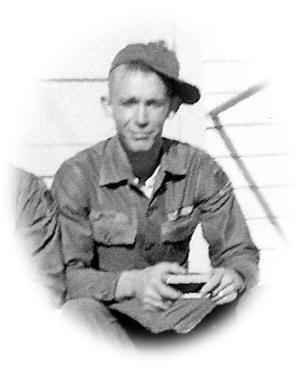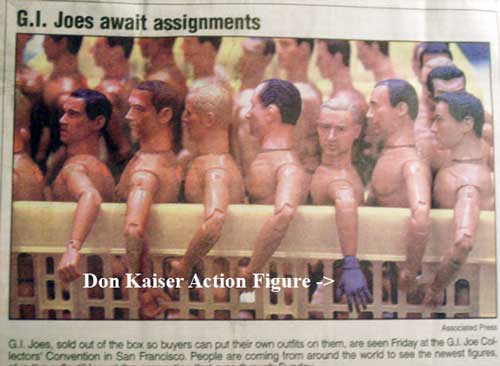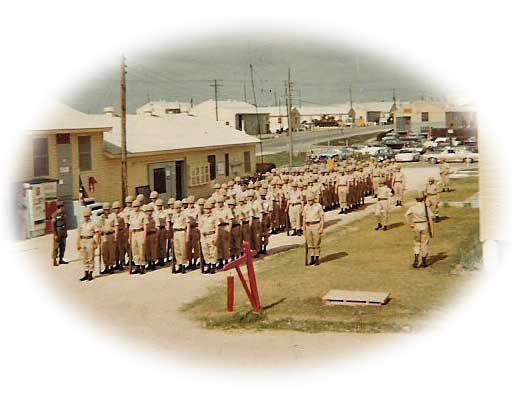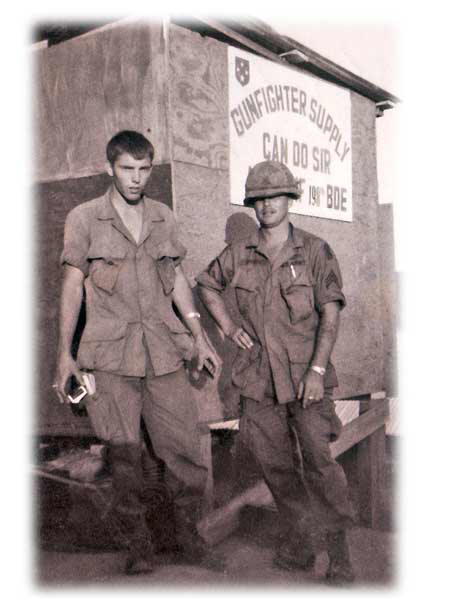|
|
Company A, 1st Battalion, 6th Infantry
|
|
|
Memories 1-10 from Alan Allen
Rifleman, Fire Team A, 1st Squad, 1st Platoon, Company A
|
|
|
PROLOGUE
When people ask me what years I was in Vietnam (and it's usually only other veterans who care enough to ask), I say, with some sarcasm, "The good years, 1967-68." I say it like that for good reason. In 1967 the United States killed 11,153 of its young men, the cream of America. In 1968 we lost 16,589. In 1969 we lost 11,614. The next highest year we lost 6,083, and that was 1970.
It should be against the law to send youngsters to fight a war. I look at the photos of us back then, when I was 6' 3" and weighed 146 pounds, and realize we were children. It should also be a felony to send them without the full backing of their country. But it should be a crime punishable by death to send them, then not welcome them back with open arms. |
|
1.
My name is Alan Allen.
I was born in
My earliest memory is of being lost. Around the age of three I wanted to go to a small pond about 140 yards from the house, one Daddy dug with a half-stick of dynamite. Halfway back, or halfway there, I forget which, I felt lost. I'm not sure now if I really was lost, or if I was just tired and/or scared, but I stopped, stood, and cried until my mother came and got me. The feeling of being lost has stuck with me all my life.
I also remember my cousin Buster Kennedy. He was the son of our Cousin Ella--"Cudd'n Eller," a wonderful, sweet lady. He sat on her porch all day. He was a lot older than the other cousins I played with, and about all he could do was wave one hand when we called to him as we ran past. He was in World War II.
When he was shipped home, Mother said when his ship arrived in Galveston the Army put him on a train to Lufkin, Texas, the nearest town with a station. They told the conductor to put him off there. A girl he had dated happened to see him sitting there on a bench and recognized him. They put him in a buggy and took him to Cudd'n Eller's so he could sit on her porch the rest of his life and wave as I ran by. Luckily, for him at least, he died before she did, so he had her taking care of him until he died.
My older brother Joe Ed
and I got to grow up in
I remember well when we got our first outhouse--yes outhouse, not to be confused with indoor plumbing. I was about nine, and the outhouse was "used". My Uncle Lawrence Toney, who was a bugler in WWII, had put in indoor plumbing and he let us have his old outhouse. I also remember our first indoor toilet and our first television. We weren't illiterate hillbillies, in fact, my family is very well educated, and we just didn't seem to need the finer things in life. |
|
2. CHESTER
When I was between the
ages of about four and six, we'd live in Chester, Texas, (near The Big
Thicket north of
There also was a small hole of water at a culvert on the way to the school where we sometimes craw fished. That's where my poor left foot began its injury-fraught journey through my life. Me and my brother Joe Ed and another kid were craw fishing at the culvert hole about 100 yards from the house. I decided to go to the other side by a locust bush to try my luck there. Barefoot, I stepped on a locust thorn, which went in so far I could see the tip of it not quite poking through the skin on top of my foot. I think the cross-barbs, which make locust thorns look sorta like a cross, kept it from penetrating any farther.
I screamed for help, which got Joe Ed's attention, but when he and the other kid saw the blood, they ran away. I thought they were scared and had left me to bleed to death, but they'd gone for help.
Then came one of the most wonderful memories of my childhood: my mother, about 25 then, and tall and graceful, came floating rapidly down the dirt road like a gazelle, dark hair and white-and-black houndstooth dress flowing out behind her. She was a vision.
I was never so happy to see anyone again.
The school where Mother taught was first grade through high school. I cried every day in first grade for several days, even though the teacher was my Sunday School teacher, Mrs. Cockerel, and I thought she was wonderful. I just didn't want to be hemmed up in a room when I could be crawdading or playing. I even snuck away from school a few times and Mother would have to walk down to the house at lunch and fetch me back.
My bathroom episode didn't increase my appreciation for school either. A classmate and I were peeing in the urinals one day, and I'm sure I was in a hurry to get back to the playground.
(A WARNING to the uncircumcised, and especially to the circumcised: Don't be in a hurry when zipping up!)
I zipped my foreskin up in my zipper. I didn't just nick it, or get it partially caught, I jerked the zipper up so a tiny hunk of meat could be seen pooching out my fly. Ouch didn’t come close to covering the situation. I didn't have the guts to unzip it, and I sure wasn't going to let my little friend try. My only hope was that some adult might determine a miraculous way out of this that would not entail as much agony as I'd suffered getting into it; I certainly couldn't be expected to think of a way out in that condition.
Regrettably, my only option was to send my friend for: 1. The nearest adult, who happened to be a female, who also happened to be, 2. my Sunday School teacher, and 3. my first-grade teacher, and 4. (I haven't told you this yet ) the wife of our preacher. Although she must have been in her 60s at the time, it still was very embarrassing. But with the strength and determination of a Baptist preacher's wife she zipped my zipper down, quick. Like that black kid said on the TV show Clueless when he dumped his girlfriend, "Free at last, free at last, free at last!" |
|
3. REDLAND AND LUFKIN
My left foot has had a tough life. I've already told you about the thorn going almost through it in 1952.
When I was about seven several in my extended family went to the WOW (Workers of the World) field to watch Uncle Lawrence Toney play softball. The adults were in the stands, and us kids were running around having a fine time. I was chasing someone, running between two sets of bleachers, when it came time for a ball player sitting in the stands to go onto the field. He jumped from about four bleachers up just as I ran under, and landed on my left foot--with his cleats. He cut my foot in three places; two of them were pretty bad. That was in about 1954.
Most of my left leg, and all my left foot, is paralyzed from an AK-47 round that hit my spine in May, 1968. In September, 1968, I also had a bed-sore on my left heel.
About July, 1976, we bought a house one block down from the house we were living in; I cleaned up the old house, while my wife unpacked in the new one. When I finished and drove down to the new house, the vacuum cleaner I'd been using rolled out of the van and fell on my left little toe. (I had saved $76.50 by moving the small stuff, instead of hiring the moving company to do it, but it cost about that same amount to have my toe x-rayed--and on top of that, nothing is done for a broken little toe, you just wait for it to heal.
And in 2003 my paralysis caused me to fall. I sat squarely on my paralyzed left big toe, which bent back until the knuckle split wide-open and required stitches.
In 2007 a big blister
formed on the heel of my left foot. I guess the paralysis has caused the
muscle to atrophy, so I'm putting my weight on mostly cartilage and sinew.
I'm left with something like a big bed sore, which took three months to heal. In 2008, it happened again, only this time it took five months to heal.
They should make a movie about my left foot. |
|
4. PASADENA, TX
I quit Stephen F.
While in Pasadena I worked in a machine shop and saw a young man get his thumb caught in a roller machine. A roller machine moves slowly, and once you turn off the power it very slowly stops moving. Once his thumb got caught he turned off the power, but the machine kept slowly moving, slowly pushing a steel bar through his thumb and nail. It was gruesome, but nothing compared to what I saw in Vietnam. |
|
5. FORT POLK, FORT HOOD, KP
Despite having gotten
married on June 3, I was drafted on October 3, 1966. I left my parents' home
on a beautiful, cool and foggy morning, and drove to Lufkin with my best
friend, David Kelsey and his older brother Reagan. David and I were taken to
I was 19 years old that first night at Polk, and most of the 25 guys I was with were 18-20--but I could clearly hear 6 or 7 of them boo-hooing out loud as I went to sleep. I'd have been okay alone, but their crying made me feel like crying.
At Polk, since we
hadn't been assigned to anything or anywhere, the Army decided KP (kitchen
patrol) should be handled alphabetically. I got KP for the first week and the
first weekend we were there. Then they set up the KP roster, alphabetically
of course, and I got KP for weekdays and a weekend.
Then after that week the Army decided we should be moved to Fort Hood in Central Texas. (To our dismay, Kelsey stayed at Polk.) When we first got to Hood, and since we hadn't been assigned to anything or anywhere, the Army decided KP should be handled alphabetically. I got KP for the first week and the first weekend we were there. Then the official KP roster came out, and it was alphabetical of course, and I got KP the next weekdays and weekend. I'd had KP eight times before most of the other guys had it once.
I was put with 4th
Platoon, Company A, 1/46th Armored Division. My cousin, Dennis Hopper, from
Central, TX, a bit northwest of |
|
6. THE FUNNIEST THING
Ron Bozeman was almost as crazy as me, comedy-wise, but one trick he pulled while we were in “the service,” was better than all mine.
When we left Fort Polk the Army sent us to Fort Hood by bus. There was nothing to do on the bus, so Boze had plenty of time to think. It wasn’t long before he started a conversation with Don Kaiser, a good-looking kid from Yoakum, Texas:
“Kaiser, did they issue you all the gear you’re supposed to have?” asked Bozeman.
“Yeah, I think so,” said Kaiser.
“You get an entrenching tool?” continued Bozeman.
“Yes.”
“Did you get a sleeping bag?”
“Yes, I got a sleeping bag,” said Kaiser, with a little irritation in his voice.
“Well,” said Bozeman, “did you get your masturbation glove?” Silence!
“What?” said Kaiser.
“Did you get a masturbation glove?” repeated Bozeman. “We’ll be in here a long time man; you’re going to need one.”
“But I didn’t get one,” squeaked Kaiser.
“You better go tell that sergeant at the front of the bus,” said Bozeman. “They made a mistake, and you better get it fixed before we get to Fort Hood.”
Kaiser went up front and started explaining his problem to the sergeant. Needless to say, when he blurted out the words “masturbation glove,” the sergeant went berserk and dropped Kaiser for 20 pushups.
That was 1966. In 2003
I finally relocated Bozeman in the |
|
7. SICK CALL
During basic training, while we were on bivouac (kinda like camping out, but not as much fun) I went on sick call with bronchitis. The sergeant in charge looked at the "Allen" on my shirt-name tag and wrote it down in the last-name box on his report form. He then ask me my name. I said, "Alan," and spelled it, "A-L-A-N." He erased the Allen and wrote in Alan. He then asked for my first name. I told him, "Alan, A-L-A-N." An officer behind him, who knew me, was starting to laugh. I felt so bad from being sick it wasn't that funny, and I didn't feel like explaining. The sergeant wrote Alan in the first-name box, erased the Alan from the last-name box, and asked me my last name. I told him my last name was, "Allen, A-L-L-E-N," and he just stared at me. At this point the officer stepped in and explained the situation, and I was finally sent to the hospital.
I got out of the hospital and returned to my platoon just as they were returned to our barracks. I didn't see a dirtier, sorrier looking bunch of men until I got to Vietnam. Bivouac at Fort Hood was rough; in fact, I'd rather camp out in Vietnam than at Hood, anytime. But I still can't figure, since we all knew we were going to Vietnam, why we were put in an armored division. I also find it a bit puzzling that the Army taught me "Jungle Training" at Fort Hood in Central Texas. There isn't a jungle anywhere for hundreds of miles. |
|
8. FIRST CASUALTY
One kid in our company got a "Dear John" letter from his girlfriend while we were out on bivouac. The letter, coupled with harassment by the non-commissioned officers and officers, and the loneliness and stress, was too much. He kept a live round from a day at the firing range, put it in his M-14 rifle, put the barrel in his mouth and pulled the trigger.
Our first of many casualties. |
|
9. STATESIDE MILITARY
After basic training they transferred about half our battalion into the 1st Battalion, 6th Infantry Regiment, Americal (23rd) Division. I was sent to Company A or Alpha Company, the 1st Platoon, 1st Squad, Fire Team A (it really pays to have a last name beginning with an "A" in the military). Hopper stayed in 1/46th, but they didn't have it any better in Vietnam than 1/6th. I think it was right before we went to Vietnam that they formed us up into the 198th Light Infantry Brigade.
One of the best things about 1/6th was we did the rest of our training together. I already knew a bunch of the guys. I quickly came to know the rest. We went through AIT (Advanced Infantry Training) and Jungle Training together. Basic was six weeks, and the other two took the rest of a year. We were together longer than most trainees, came to know each other well, and could depend on one another. We knew each others' strengths and weaknesses. That was all a plus in combat, and it helped you get through the rigors of the days and fears in the nights of Vietnam. Of course, it also is one of the worse things. It hits you harder when you see friends killed than when you see someone you just met go down. It hurts even more when you drag them out of a rice paddy and the mud and the fear and the death on their faces has changed them so you can barely recognize which friend is which.
(The people you're with in combat become ingrained in your brain. They're something more than friends. They're something more than family. They become you. They'll always be you. The ones you love the best. The ones you love the least. You love them all. They're you and they always will be you. I sometimes wonder if they will leave you if you die.) |
|
10. OFFICERS AND NCOs
At the end of that year of training the Army deemed us fit to fight in Vietnam. Yet after we got to Vietnam a few of the city kids still let their guns go off accidentally--a few even after we'd been there months.
Two other good things
happened during our training before we shipped out for Vietnam. One, our
platoon got Sgt. Van Horn as Platoon Sergeant. He'd already been to
Vietnam two times, had been shot up both times, and couldn't wait to go again
cause he loved combat and killing people. And second, we got 1st. Lt. William
"Wendy" Wendover as Platoon Leader. He'd never been to |
©2007 by Alan Allen , All Rights Reserved
Privacy Policy: Don't give us anything you don't want the world to see. .


